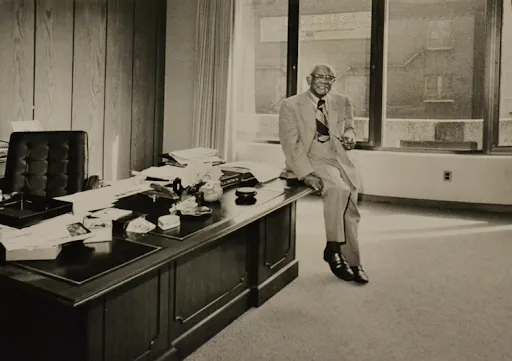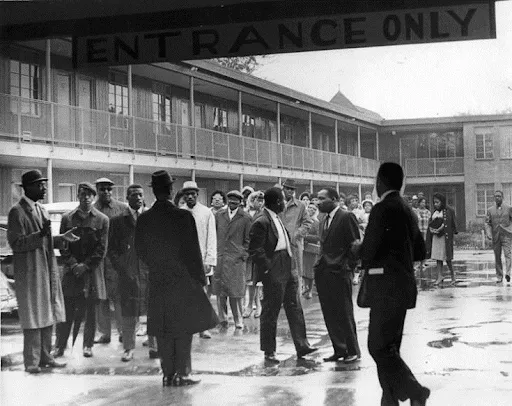A.G. GASTON A NOTED BUSINESS AND POLITICAL LEADER IN HISTORY
By Amaya Henry | February 2023
While business leader Arthur George (A.G.) Gaston’s legacy slips through the cracks of history, his role as a business and political leader should not be overlooked.
Early Life
Gaston was born on July 4, 1892 in Demopolis, Alabama. His father died at an early age and he grew up with his grandparents and his mother. In 1905 Gaston and his mother Rosa moved to Birmingham, Alabama, where he would start most of his businesses. Before his monumental success, he served in the army during World War I and also worked for the Tennessee Coal and Iron Company which is where historian Suzanne Smith notes that his entrepreneurial career began.
Gaston Laying the Foundation for His Success
During the time that Gaston worked at the Tennessee Coal and Iron Company, mining was a dangerous job to have. According to the United States Department of Labor, between 1901-1925 there were 356 mine disasters where there were at least five deaths. With the large numbers of people dying on the job, Gaston noticed that there was a need for a proper burial home in the Black community. This idea would be the one that pioneered his fortune.

(Credit: al.com)
After noticing this need, he started his first business, a burial society called the Booker T. Washington Burial Society in the early 1920s where members paid weekly fees of $0.25 which entitled them to a proper funeral if they were to die on the job. His company began to quickly grow as he had other prominent members of the community, like ministers and gospel singers, support his business as well as encourage others to join. As his business continued to grow, Gaston began to broaden his horizons and in 1932 he expanded his company to offer life, health, and accidental insurance and renamed his company and thus the Booker T. Washington Insurance Company was born.
Gaston’s problem-solving skills were evident as he soon realized that few Black people had the proper education to work for his new insurance company. As a solution to this problem, he established the Booker T. Washington business school. By doing this he was not only helping his own company, but he was also providing Black people with the opportunity to expand their knowledge and hone in on their skills, an opportunity that was previously not an option.
As his net worth began to accumulate Gaston began to start more and more businesses including the Vulcan Realty and Investment Company, the A. G. Gaston Home for Senior Citizens, the WENN-FM and WAGG-AM radio stations, S & G Public Relations Company, and the A. G. Gaston Motel. His motel was a place for Black families to lodge in as they traveled through the segregated South. Celebrities like Aretha Franklin, Duke Ellington, James Baldwin, and Harry Belafonte are also said to have stayed at the motel.
Civil Rights Involvement
As the Civil Rights movement began to take shape in the 1950s, by this time Gaston had become a prominent member of the Birmingham community. Gaston was not as radical as other political leaders at the time and used non-confrontational tactics which explained why he was not on the forefront of the cause and instead worked from behind the scenes. For example, he was able to get the “whites only” sign removed from the First National Bank because he told them that he would withdraw his money from their bank if they refused, which was millions of dollars that the bank couldn’t afford to lose.

Martin Luther King, Jr. outside Gaston Motel in 1963. (Credit: National Park Service)
Gaston believed that change could be made without violence. He preferred meeting and having a conversation in order to resolve racial issues rather than a protest. Despite this belief, Gaston still supported the cause in his own way. He provided a reduced rate and space for prominent leaders Martin Luther King Jr. and Ralph Abernathy and other civil rights leaders at his aforementioned A.G. Motel. Room 30 of the motel became known as the “War Room” as this was where Project C was devised. Gaston even bailed King Jr. out of jail for $160,000 when he was arrested during the Birmingham Campaign. As a result of his affiliation with King Jr. and Abernathy, after less than 10 years of business, on May 12, 1963 the A.G. Motel was bombed and in September of that same year, Gaston’s own house was also bombed. So although he was not on the frontlines of the Civil Rights Movement, he still endured some of the effects of supporting racial equality.
Gaston’s Other Projects
As the Renaissance man that Gaston was, in 1968 he published an autobiography titled Green Power: The Successful Way of A. G. Gaston detailing his life story while simultaneously encouraging Black entrepreneurship. His book is still read today as one reader acclaimed, “This book was very insightful. He provides a snapshot of history through his amazing autobiography and provides practical tips that can be applied for success in any endeavor or facet of life,” on Amazon. Age didn’t slow Gaston down as in 1984 at the age of 92 when he received a request from the Secretary of Housing and Urban Development (HUD) and the Housing Authority of the Birmingham District (HABD) to participate in a pilot program that sought to renovate several Birmingham public-housing properties he created the A.G. Gaston Construction Company that is still in operation today. Over time this construction company would transform from a local contracting business to one of Central Alabama’s most successful construction and management services. On the company’s website they state that they are known for three things: innovation, dedication, and passion. This exemplifies Gaston’s dedication to his work as his personal values were closely aligned with his business ones.
Gaston’s Impact
While Gaston is rarely mentioned in the history books, he did receive many accolades and honors during the last decade of his life. Although he only achieved a 10th grade education, in 1975 he received an honorary law degree from Pepperdine University. According to the Encyclopedia of Alabama, in 1976 he was named an honorary president of Troy University and the Alabama Broadcasters Association named him its citizen of the year. In 1992, he was named in the Black Enterprise magazine’s “Entrepreneur of the Century.”

Follow Us On
Contact
© 2023-2022 Celebrity Boss Inc., All Rights Reserved.